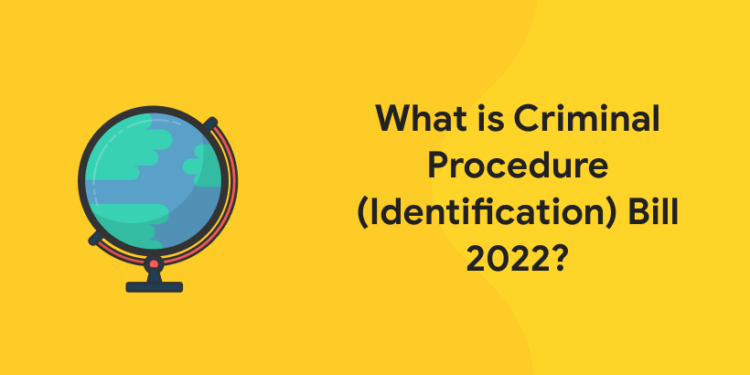Table of Contents
The Criminal Procedure (Identification) Bill 2022 strives to permit authority to carry out the measures to categorize those who are condemned, suspended, sentenced, or imprisoned. The Criminal Procedure (Identification) Bill 2022 qualifies law enforcement agents to accumulate an innholder of biometric data and biological specimens from criminals and additional individuals to assist pinpoint delinquents and scrutinizing crimes. On 28th March 2022, the Criminal Procedure (Identification) Bill 2022 was familiarized in the Lok Sabha for the first time. The key pursuit of the bill is to empower law enforcement agencies. The next agenda is to help the law enforcement agencies in bearing dimensions of prisoners to smoothly recognize and analyze illegal issues and maintain documents · The statement also defines how data will be registered and maintained.
Criminal Procedure (Identification) Bill 2022: Important Features
The Criminal Procedure (Identification) Bill is a bill in its terms that is powerful to identify everything related to the suspected criminals or individuals who are assisting the crimes. The Bill is deemed as the one which supersedes the tag Prisoners Act which was introduced in the year 1920.
The Act authorizes the assemblage of specifically identifiable data and available facts about selected individuals which include prisoners for the research of corruption or crime. The Bill extends to the level of digging up the elements, components, and details that can be collected to meet the purpose of the investigation. It empowers the National Crime Records Bureau to gather, stockpile, and conserve the details but should maintain confidentiality. The Act allows the preservation of snapshots and defined facts about criminals and individuals under police suspicion. This procedure includes the collection of fingerprints and footprints.
Ace to the best books for web development here!
The palm-print impressions, behavioral attributes such as signature and handwriting iris and retina scans, samples such as blood, semen, hair samples, and swabs, are all included in this collection. Impressions of the finger and foot will be collected and stored. The Bill develops an index of fragments that can be helpful in many ways. As per the bill, the individuals sentenced for particular violations, individuals summoned to protect exemplary conduct or preserve equilibrium under the Code of Criminal Procedure, 1973, and somebody captured for a crime punishable with at least one year of rigorous imprisonment are the people whose samples and details are collected and preserved on an emergency basis.
The Bill needs the attributes managed to be contained in digital or electronic structure for 75 years from the date of collection. The opposition or rejection to provide attributes will be deemed a transgression under the Indian Penal Code, 1860. In such cases, the samples can be directly collected by the authority. The details shall be collected by the authority who is in control of a police station, leads an examination under the CrPC, or are at most undersized at the level of a Sub-Inspector.
Beneath the Bill, a Magistrate may demand an individual to provide components for the pursuit of an inquiry or cruising under the CrPC. The Bill authorizes NCRB to organize the particulars about the individuals shielded under the Bill from union territory (UT) administrations, and state governments. The Bill augments the power to handle the bill directly or indirectly to the central government too. The measurements that can be used for the investigation include Appearances of fingerprints, Photographs, Palm marks and foot impressions, Iris and retina scans, Investigation of material and physical samples, Behavioral attributes, Autograph and Calligraphy.
Ace to the best ways to crack clat without coaching here!
Refusal to Comply Criminal Procedure (Identification)
1: Who was the first woman President of India?
The government can be directly involved in a case where the person under the need refuses to provide samples for preservation. Under the requirements of the act, the denial or resistance to accepting measures is an offense under section 186 of the Indian Penal Code(IPC). No claim or any further proceeding shall fib against any individual for anything done, or planned to be done, in an acceptable conviction under this Act or any regulation made thereunder. The central government or state government can carry out the necessary steps according to the rule.
Grab latest GK study materials! Register here!
Free UPSKILLING Courses!
Take your first step toward mastering in-demand skills, acing interviews, and securing top-tier jobs with Entri's free upskilling courses.
Start Learning!Criminal Procedure (Identification)Bill: Issues
Expresses that no individual charged with an offense shall be forced to be a bystander against himself which is mentioned in Article 20(3) of the Constitution. The bill can help the authority prove their innocence and find the real culprit among the citizens. The bill is successfully finding its way into solving umpteen criminal offenses.
The Entri App can help the candidates to solve any issues related to the General Knowledge section or the competitive exams. Find the best source of information at Entri App at any time.













